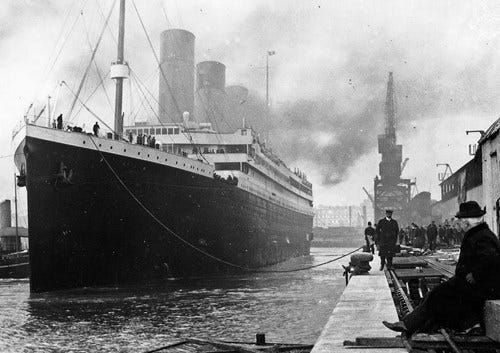Why We Ignore Good Advice and Buy the Watch Anyway
Ramblings on Advice, Missteps, and Finding Your Own Path
On Wednesday 10th April 1912 shortly after midday, the RMS Titanic set sail from Southampton’s White Star Dock on her maiden voyage to New York. Captain Edward J. Smith, RD, RNR, received numerous warnings about icebergs in the ship’s path. Despite his 40 years of experience at sea, Smith ignored the advice, maintaining the ship’s speed and course. We all know how that ended - with ~1,500 souls lost to the icy depths of the Atlantic.
Fast forward to 1986. The night before the launch of the Space Shuttle Challenger, engineers from Morton Thiokol advised NASA to postpone due to concerns about the O-ring seals in cold weather. NASA managers overruled this advice, leading to a catastrophic explosion 73 seconds after liftoff, claiming the lives of all seven crew members.
These tragic examples illustrate a peculiar quirk of human nature. That is, we have a tendency to ignore good advice, even when the stakes are astronomically high.
Why doesn’t advice work?
In watch collecting, this quirk of human nature to ignore good advice plays out daily. Despite the stakes being lower, the principles remain the same. Why doesn’t advice work in this world where every collector’s got opinions and “insider knowledge” floods your WhatsApp chats daily?
When the Advice is as Genuine as a Promise from your AD
Let’s face it, in our hobby everyone’s an expert. From the seasoned collector with a vault full of Pateks to the bloke who just bought his first Rolex, opinions flow as freely as the wine at a Journe event.
I once attended an event where a self-proclaimed “vintage expert” was pontificating about the rarity of a particular Omega Speedmaster reference. He waxed lyrical about its unique dial variant, claiming it was produced by accident with some flaw, and quickly retracted from the market.
There was just one small problem: the reference he was describing didn’t exist.
The watch world is a jungle of misinformation, from harmless myths to the truly nefarious (hello, counterfeiters). When the advice itself is questionable, it’s no wonder we sometimes tune it out.
Advice Which Lacks Experience
In collecting, as in life, there’s no substitute for experience. You can read all the watch books in the world and memorise every reference number, but until you’ve felt the weight of a solid platinum Journe on your wrist or experienced the heartbreak of a crown snapping off in your hand, some nuances will always elude you.
I’m reminded of a young collector I met at a watch meetup. Fresh-faced and eager, he’d just started his journey into the world of haute horlogerie. He’d done his homework, that was clear. He could rattle off the beat rates of different movements and explain the intricacies of various escapements. But when it came to actually handling the watches, he was like a bull in a china shop.
He picked up a delicate vintage Patek, flipped it over, and started winding it vigorously. The collective gasp from the other collectors could have powered a tourbillon. Gently, an older gentleman stepped in, explaining the proper care for vintage movements and demonstrating the delicate touch required.
The young collector’s advice might have been technically correct, but he very clearly lacked any hands-on experience. Hardly someone you’d ever trust! Some advice needs time to develop its full character.
When the Advice is Unclear
Clarity in the world of watches is crucial. Unfortunately, some guidance is about as clear as a heavily scratched hesalite crystal on a well-worn Speedmaster.
I once overheard a conversation between a seasoned collector and a newcomer to the hobby. The veteran was trying to explain the concept of ‘provenance’ and why it matters in vintage collecting.
“It’s all about the story, you see,” he said, waving his hands expansively. “The watch needs to have a good story. Without a story, it’s just another old watch.”
The newbie nodded sagely, clearly not wanting to appear ignorant. Later, I found him scrutinising a rather unremarkable old Omega, muttering about how it “must have a great story”.
The advice wasn’t wrong, per se. Provenance can indeed add significant value to a vintage piece. But without clear examples or explanation, the guidance was about as useful as a watch without hands. You might (think) know there’s something important there, but you can’t quite make it out.
Advice Which Feels Unreliable
Trust is the cornerstone of any good advice, just like reliability is important in a good watch. Sometimes, even if the advice is sound, it can feel as trustworthy as those early Journe movements which promised to revolutionise timekeeping but often left wearers with dead watches and dashed hopes.
I recall a heated debate at a watch collector’s dinner about the investment potential of certain modern watches. One collector, let’s call him Dave, was insistent that a particular independent brand was the next big thing. “Their value will triple in five years,” he proclaimed confidently. “I have insider information.”
Now, Dave wasn’t a bad chap, and he might even have believed what he was saying. But his track record wasn’t exactly stellar. This was the same Dave who, a year earlier, had confidently opined on why smart watches would make mechanical watches obsolete within 5 years.
Even if Dave’s advice this time was spot-on (it wasn’t), his credibility was as sh1t as a watch that’s been through a washing machine spin cycle. When advice doesn’t feel reliable, it’s hard for it to gain any traction, no matter how accurate it might be.
One Collector’s Grail is Another’s Paperweight
With watches, personal taste reigns supreme. What one collector considers the epitome of horological achievement, another might dismiss as an overpriced paperweight. This subjectivity makes universal advice in the watch world about as useful as a Richemont Executive.
I witnessed this firsthand at a collectors’ event where the topic of discussion was “Grail Watches”. As members shared their ultimate pieces, the diversity was startling. One member rhapsodised about the elegant simplicity of a Patek Philippe Calatrava. Another waxed poetic about the engineering marvel of an Urwerk 112. A third insisted that nothing could top the rugged functionality of a Rolex sports watch.
Then a quiet member in the corner finally spoke up. His grail? His grandfather’s Citizen. The room fell silent, then erupted in a mixture of laughter, eye-rolls, and genuine curiosity.
This diversity of opinion makes blanket advice in the watch world problematic.
Telling someone they “must” own a particular watch or brand is like insisting everyone should love eating liver. It simply doesn’t work that way. I hate liver.
What works for some collectors might leave others cold. The key is understanding that watch collecting is deeply personal. The best advice acknowledges this subjectivity rather than prescribing a one-size-fits-all approach.
Are You Really ‘Asking’ ?
Asking for advice often has less to do with actually seeking guidance and more to do with validation, entertainment, or simply the joy of talking about watches. This is like browsing Chrono24 at midnight - you’re not really planning to buy anything, but it sure is fun to look.
I’ve lost count of the number of times I’ve been asked for advice on choosing between two watches, only to discover that the inquirer had already made up their mind and was simply looking for affirmation. It’s like asking a magic 8-ball for any advice – you’re going to shake it until you get the answer you want.
At a recent dinner, a guy asked the group’s opinion on whether he should buy a particular watch. For an hour, we debated the merits of the piece, its potential future value, how it would fit into his collection. Opinions were shared, stats were quoted, loupe examinations were conducted. Finally, satisfied with the thoroughness of our discussion, he nodded sagely and said, “Thanks everyone. I actually bought it last week, I just wanted to make sure I made the right choice.”
Cvnt.








